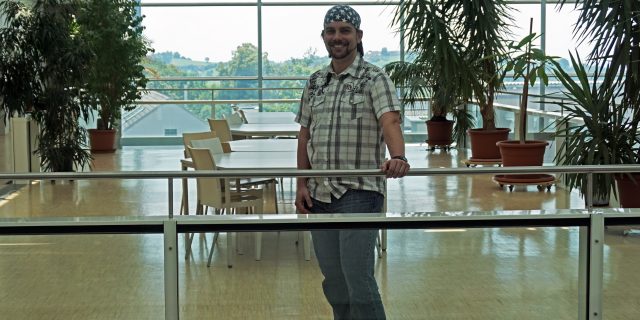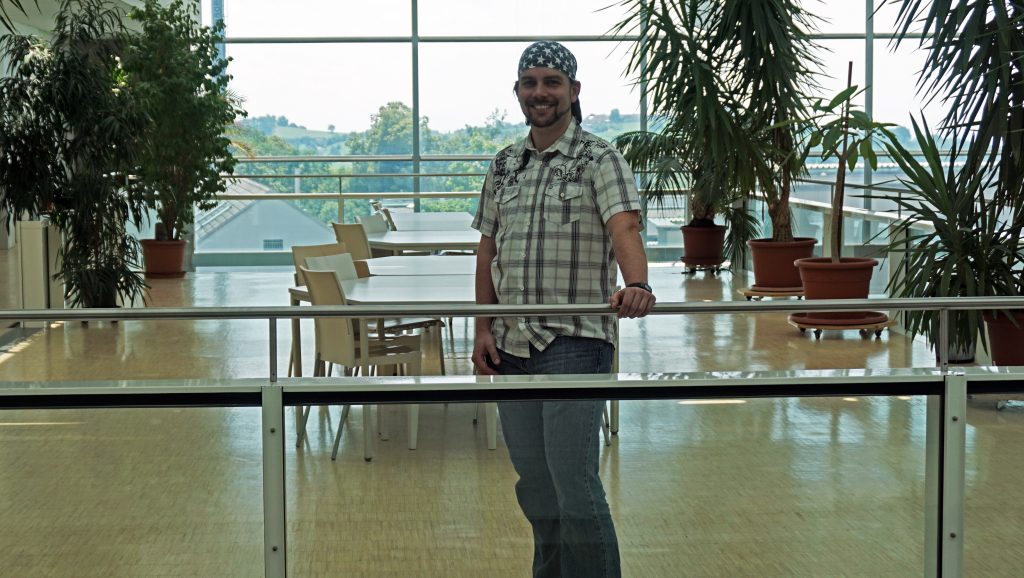
Master thesis in the department of medical informatics about virtual cutting system: Thomas Kniplitsch
Thomas Kniplitsch studied software engineering at Hagenberg University of Applied Sciences and developed a virtual cutting system for the two outer layers of the meninges in his master’s thesis. He was supervised by Dr. Wolfgang Fenz from the Medical Informatics research department at RISC Software GmbH.

What is your master’s thesis about?
Thomas: The goal of the master’s thesis was to develop a virtual cutting system for simulated dura mater and arachnoid, the two outer layers of the meninges. Since the dura mater is less intertwined, this was focused on first. A mass-spring-damper model was chosen as the physics simulation because it can handle topology changes at runtime better than, for example, a finite element model and is also simpler in structure. As a simulation topology, a triangle-based surface mesh was preferred over a volumetric variant, since meninges have a relatively small volume relative to the surface area.
In analyzing existing cutting algorithms, it was found that most systems either alter the geometry of the physics elements and thus their behavior, or render cuts with insufficient accuracy. A hybrid approach that partially decoupled the represented surface from the geometry of the physics simulation was chosen as a starting point, but the existing algorithms were found to be inadequate. This led to the development of a new cutting algorithm, which is the core of the master thesis. This allows balancing of cutting accuracy and complexity of the displayed elements via parameters while maintaining similar performance of the physics simulation as other hybrid approaches.
In addition to the cutting algorithm, data structures were developed for partitioning the simulation domain and merging points, which should prove useful outside of the cutting algorithm.
Where are the concrete problems in real use cases? What were the challenges of the topic? What skills did the person supervised demonstrate in the course of the master’s thesis, what was solved particularly well?
Betreuer Wolfgang Fenz: The topic was chosen with the background of integrating the cutting algorithm later in the virtual component of the MEDUSA training simulator for neurosurgeons to simulate the free preparation of brain aneurysms, which includes among other things the cutting of meninges. Both the (visual and physical) realism and the real-time performance of the method are key challenges. In the course of his master’s thesis, Thomas Kniplitsch has familiarized himself very well with the complex topics of mesh cutting algorithms and the anatomy or physical properties of cerebral membranes and has shown great skill both in researching the state of the art and in the implementation as well as the development of new efficient data structures. It is particularly gratifying that a paper based on the results of the work has already been accepted for presentation at an international conference.
How did you come to write the paper on RISC Software GmbH and what was the supervision and process like?
Thomas: I became aware of RISC Software GmbH at the FH Next career fair. I was particularly attracted to the field of medical informatics. This led me to do a professional internship at RISC Software GmbH while I was still studying for my bachelor’s degree. After completing the internship, I was taken on as a part-time employee, which is how I came to work on the Medusa and Ares projects. Since master’s theses are also done in these areas, it was naturally a good choice for me. My supervisor was also my colleague, with whom I had already worked anyway, which was of course super practical and pleasant. In addition, I was able to take months of vacation or time off during my studies, for which I am very grateful.
In which fields of activity would you like to work in the future? What are your plans for the future?
Thomas: Since I have only had positive experiences at RISC so far, I would like to continue working here. I am very satisfied in the Medical Informatics department, and I particularly appreciate the pleasant working environment and the flexible working hours. In addition, I find the work in medical research very meaningful, so I hope to be able to work here for a very long time to come.
Do you also want to work with us?
